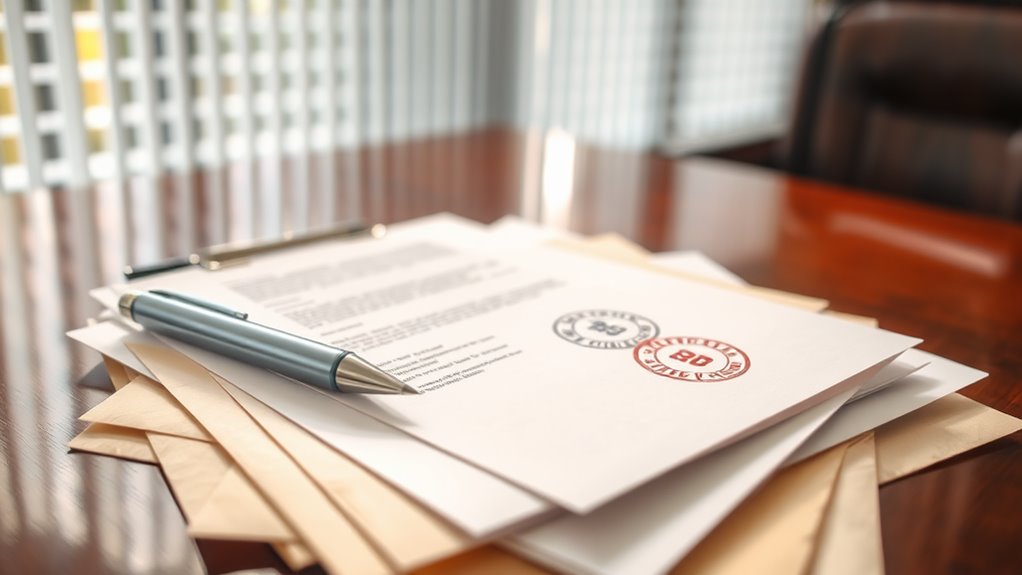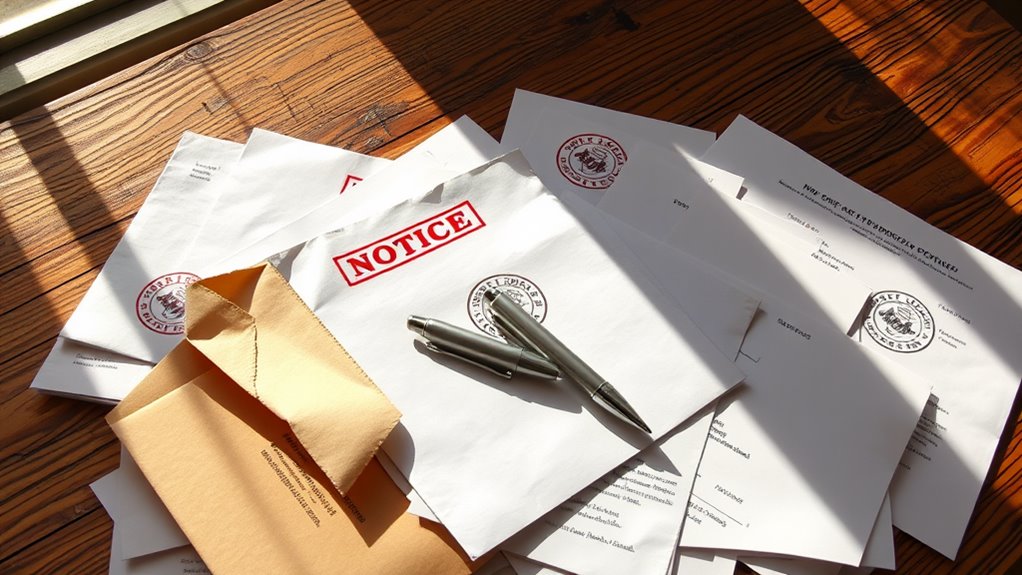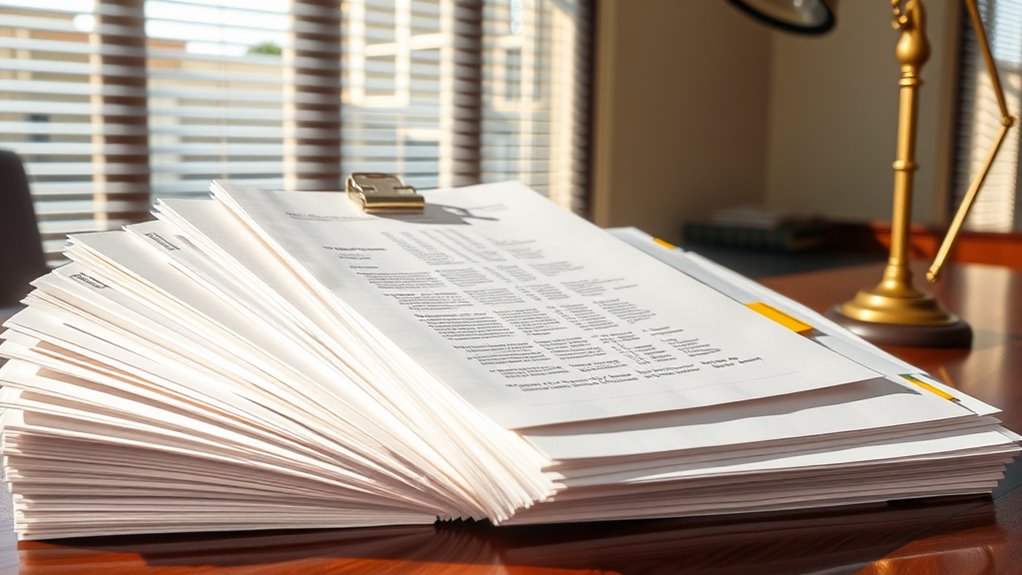Legal papers are essential tools in the judicial system, serving various roles in facilitating communication and ensuring due process. They include notifications such as summons, notices of eviction, and subpoenas, each with specific legal implications. Compliance with these papers is vital to avoid significant legal consequences, including loss of rights and financial penalties. Understanding the importance of these documents can aid parties in steering through the complexities of legal obligations. Further exploration reveals best practices for handling legal notifications.
Key Takeaways
- Legal papers, such as summons and eviction notices, formally inform parties of their rights and obligations in legal matters.
- Summons initiate legal proceedings, providing defendants an opportunity to respond and ensuring due process.
- Notices of eviction detail grounds for removal, emphasizing the importance of tenant response options and proper landlord procedures.
- Subpoenas compel individuals to testify or produce documents, crucial for evidence collection in legal cases.
- Compliance with legal notifications is essential to avoid penalties, such as fines and default judgments, which can adversely affect case outcomes.
Understanding Legal Papers and Their Importance

Legal papers serve as the backbone of the judicial system, encapsulating the formal communications and records essential for the administration of justice. Their significance extends beyond mere documentation; they embody the principles of legal terminology and procedural integrity. Each legal paper, whether a summons or a complaint, plays a pivotal role in guaranteeing that all parties involved are adequately informed about their rights and obligations. This underscores the notification importance inherent in legal processes, as timely notifications facilitate transparency and fairness. The meticulous nature of these documents guarantees that legal proceedings can be conducted smoothly, preserving the rule of law. Understanding the critical function of legal papers fosters a deeper appreciation for their role in safeguarding individual rights and promoting justice in society. Moreover, engaging a private investigator early can significantly enhance the chances of acquiring critical evidence which is often necessary for legal proceedings.
Types of Legal Notifications
While various forms of communication exist within the legal framework, specific types of legal notifications are vital for guaranteeing that parties are duly informed of their rights and obligations. Among the prevalent notification types are summons, which initiate legal proceedings, and notices of default, which inform parties of a breach in contract. Additionally, legal notifications may include subpoenas, compelling individuals to testify or produce documents, and cease-and-desist letters, which warn against unlawful activities. Each notification type serves a distinct purpose, aiming to maintain transparency and uphold the rule of law. Understanding these legal notifications is important, as they facilitate the legal process and guarantee that individuals are aware of their legal standing and responsibilities. Proper service of process is essential to ensure that these notifications are delivered effectively and legally.
The Summons: What It Is and Why It Matters
A summons serves as a formal notification that initiates legal proceedings by informing a defendant of a lawsuit against them. The summons definition encompasses not only the fundamental details of the case but also outlines the defendant’s rights and obligations. Its significance cannot be overstated, as it guarantees that the defendant has the opportunity to respond, thereby upholding the principles of due process. Without a summons, a lawsuit may proceed without the knowledge of the party being sued, potentially leading to unjust outcomes. By delivering this legal document, courts affirm their commitment to fairness, allowing defendants to prepare their defense adequately. Understanding the role of a summons is vital for anyone traversing the legal landscape, especially as it emphasizes the importance of gathering evidence in establishing a solid defense strategy.
Notices of Eviction: Rights and Responsibilities

Notices of eviction serve as vital legal instruments that outline the grounds on which a landlord may seek to remove a tenant from a property. Understanding the tenant’s response options and the timeline of the eviction process is essential for both parties to navigate the complexities involved. This discussion will clarify the rights and responsibilities inherent in eviction notifications, ensuring informed decisions can be made. Additionally, engaging with professional help in eviction cases can provide crucial insights and support throughout the legal process.
Legal Grounds for Eviction
Understanding the legal grounds for eviction is essential for both landlords and tenants, as these grounds establish the framework for lawful termination of a tenancy. Common reasons for eviction include non-payment of rent, lease violations, and illegal activity. Landlords must follow specific eviction procedures, which often require providing proper notice and documentation to tenants. Failure to adhere to these procedures can result in legal repercussions for landlords. Conversely, tenants possess rights that protect them from wrongful eviction. This includes the right to contest invalid grounds or inadequate notice. Knowledge of these grounds and associated rights empowers both parties, fostering a more equitable and transparent rental relationship. Clear communication and understanding are crucial in traversing the complexities of eviction processes.
Tenant’s Response Options
When faced with an eviction notice, tenants have specific options for responding that are vital in protecting their rights. Understanding tenant rights allows individuals to develop effective response strategies. First, tenants should review the eviction notice thoroughly, noting any inaccuracies or violations of local laws. They can respond in writing, providing a detailed explanation of their circumstances and disputing the eviction if warranted. Additionally, seeking legal counsel can offer insights into potential defenses and negotiation tactics. Renting organizations may also provide resources and support. Timely and informed responses can often lead to resolution or an extension, allowing tenants to remain in their homes while addressing the landlord’s concerns. Proactive engagement is essential for maintaining housing stability.
Eviction Process Timeline
Although the eviction process can vary by jurisdiction, a typical timeline involves several key steps that outline the rights and responsibilities of both tenants and landlords. Initially, landlords must provide proper notice, often a written document detailing the reason for eviction. This notice period typically spans from 3 to 30 days, depending on local laws. Following this, if the tenant does not comply, the landlord may file for eviction in court. Tenants possess rights during this process, including the ability to contest the eviction. Once a court date is set, both parties present their cases, leading to a judgment. If eviction is granted, the timeline culminates in a formal removal, emphasizing the importance of understanding tenant rights throughout the eviction timeline.
Subpoenas: Compelling Testimony and Document Production
Subpoenas serve as powerful legal instruments that compel individuals to provide testimony or produce documents relevant to a legal proceeding. There are various types of subpoenas, each with specific compliance requirements that must be adhered to. Failure to comply with a subpoena can lead to significant legal consequences, including contempt of court. Attorneys often rely on credible and reliable evidence from private investigators to support their cases and ensure compliance with subpoenas.
Types of Subpoenas
Legal proceedings often hinge on the ability to compel testimony and obtain documents essential for a case. Among the various subpoena types, civil subpoenas stand out as pivotal tools in gathering evidence. These subpoenas can be categorized into two main forms: subpoenas for testimony and subpoenas for document production. The former mandates an individual to appear and provide oral testimony, while the latter requires the recipient to produce specific documents relevant to the case. Both types serve distinct but complementary purposes, ensuring that all necessary information is accessible to the court. By understanding these subpoena types, legal professionals can effectively navigate the complexities of evidence collection, enhancing their ability to present compelling arguments in court.
Compliance Requirements
When individuals or entities receive a subpoena, understanding the compliance requirements is essential to ensuring proper adherence to legal protocols. Regulatory compliance involves meeting specific legal obligations related to subpoenas, which typically include the following:
- Timely Response: A prompt reply is vital, ensuring that deadlines are met.
- Complete Documentation: All requested documents must be produced in their entirety, maintaining integrity and accuracy.
- Confidentiality Considerations: Sensitive information should be handled carefully, adhering to privacy laws.
- Legal Representation: Engaging legal counsel can help navigate complex requirements and protect rights.
Legal Consequences for Noncompliance
Failure to comply with subpoenas can result in significant legal repercussions. Individuals or entities that ignore these legal documents may face severe legal penalties, including fines and, in some cases, contempt of court charges. Compliance obligations are critical in maintaining the integrity of the legal process; failure to adhere can obstruct justice and undermine the judicial system. Courts have the authority to enforce compliance through various measures, such as compelling testimony or document production. Additionally, noncompliance can adversely affect the party’s case, leading to unfavorable judgments or loss of credibility. Therefore, understanding and fulfilling subpoena obligations is essential for anyone involved in legal proceedings, ensuring fairness and accountability in the pursuit of justice.
Complaints: Initiating a Lawsuit
A successful lawsuit often begins with the careful drafting of a complaint, which serves as the formal document initiating legal proceedings. This foundational step adheres to specific lawsuit procedures and includes essential complaint elements. A well-structured complaint typically comprises:
- Caption: Identifying the parties and court.
- Jurisdiction: Establishing the court’s authority to hear the case.
- Statement of Facts: Outlining the relevant details leading to the dispute.
- Prayer for Relief: Specifying the desired outcome or remedy sought.
These components are vital, as they lay the groundwork for the entire legal process. Properly articulating each element guarantees clarity and facilitates a smoother progression through subsequent legal stages. Understanding these intricacies empowers individuals in their quest for justice. Additionally, engaging private investigators for attorneys can provide essential support in gathering evidence to substantiate claims made in the complaint.
Motion Papers: Requesting Court Orders

After the complaint has been filed and the lawsuit initiated, the next crucial step involves the preparation of motion papers. These documents are necessary for requesting specific court orders, which can greatly influence the course of the case. Various motion types, such as motions for summary judgment or discovery, serve distinct purposes within the legal framework. Proper adherence to court procedures is essential; failure to comply can result in delays or dismissals. Each motion must articulate clear arguments and supporting evidence, presenting a compelling case for the requested relief. Understanding the intricacies of motion papers not only enhances the chances of a favorable outcome but also guarantees that the parties involved are well-informed throughout the legal process. Additionally, employing professional surveillance may provide critical evidence to support the motions being filed.
Proof of Service: Ensuring Proper Notification
Proper notification is a critical component of the legal process, and proof of service plays an essential role in ensuring that all parties are adequately informed of the proceedings. Effective proof verification is pivotal to maintaining the integrity of legal actions.
Key service methods include:
- Personal Service: Delivering documents directly to the individual involved.
- Substituted Service: Leaving documents with someone of suitable age and discretion at the recipient’s residence.
- Certified Mail: Sending documents with a return receipt to confirm receipt.
- Electronic Service: Utilizing email or electronic filing, where permitted.
These methods not only confirm that notifications have been made but also protect the rights of all parties, thereby fostering a fair and transparent legal environment. Additionally, utilizing experienced servers ensures compliance with legal requirements, further enhancing the validity of the notification process.
Consequences of Not Responding to Legal Papers
Failing to respond to legal papers can lead to a default judgment against the non-responsive party, which may result in significant legal and financial repercussions. Additionally, neglecting to address these notifications can cause a forfeiture of important legal rights, effectively limiting one’s ability to contest the claims made. This lack of action can culminate in increased financial liabilities, further complicating the situation. It is crucial to ensure proper service of process to avoid these dire consequences.
Legal Default Judgment Risks
What happens when individuals neglect to respond to legal papers? The consequences can be severe, often resulting in a default judgment against them. Understanding the default judgment implications is vital for anyone facing legal action. The risks include:
- Financial Liability: A court may order payment for damages or debts owed.
- Loss of Control: Individuals may lose the opportunity to present their side of the case.
- Credit Impact: Default judgments can severely affect credit scores, complicating future financial endeavors.
- Enforcement Actions: Creditor actions, like wage garnishment, may follow.
Mitigating risks involves timely responses to legal notifications, ensuring individuals protect their rights and interests effectively.
Loss of Legal Rights
Neglecting to respond to legal papers can lead to significant and often irreversible losses of legal rights. When individuals fail to address legal notifications, they may inadvertently forfeit their ability to contest claims made against them. This rights loss can manifest in various ways, including the inability to present a defense or to appeal unfavorable judgments. Courts typically interpret silence as acceptance of the claims, which can result in outcomes that dramatically affect one’s personal and financial circumstances. Additionally, the complexity of legal systems often leaves individuals unaware of their options, compounding the consequences of inaction. Ultimately, understanding the gravity of responding to legal papers is essential for preserving one’s legal rights and ensuring a fair opportunity to advocate for oneself.
Increased Financial Consequences
Ignoring legal notifications can result in substantial financial repercussions that extend far beyond the immediate legal dispute. The economic impact of neglecting these documents can manifest in various forms, including:
- Financial Penalties: Courts may impose fines for failure to respond, increasing overall financial liability.
- Judgment Against You: A default judgment can result in automatic loss of the case, leading to significant monetary damages.
- Increased Legal Fees: Prolonging the situation may result in escalated legal costs, as attorneys may charge more for late interventions.
- Damage to Credit Rating: Unresolved legal issues can lead to collections and negatively affect credit scores, impacting future financial opportunities.
Ultimately, addressing legal notifications promptly is essential to mitigate these potential consequences.
Best Practices for Serving and Responding to Legal Notifications
While legal notifications serve as significant instruments for communicating essential information regarding legal proceedings, the methods employed for serving and responding to these notifications can greatly impact their effectiveness and legal validity. Best practices include ensuring that notifications are served in a timely manner, using appropriate methods such as certified mail or personal delivery, and maintaining clear documentation of the process. Effective communication is important; recipients should fully understand the contents and implications of the notification. Additionally, responding promptly and accurately is essential to upholding one’s legal rights. Legal professionals recommend consulting with experts when in doubt, as adherence to these best practices fosters clarity and reduces the risk of misunderstandings, ultimately contributing to the integrity of the legal process. In cases related to child custody investigations, it is crucial to gather evidence that supports claims and protects the best interests of the child.
Frequently Asked Questions
How Can I Track the Status of My Legal Papers?
To track the status of legal papers, individuals may utilize various tracking methods, such as online portals or direct inquiries. Regular status updates can provide clarity and assurance throughout the legal process, ensuring informed decision-making.
What Should I Do if I Receive Legal Papers by Mistake?
Upon receiving legal papers by mistake, the individual should promptly notify the sender of the mistaken delivery, ensuring compliance with legal obligations. Maintaining clear communication can prevent potential misunderstandings or complications regarding the documents involved.
Can Legal Notifications Be Served Electronically?
Legal notifications can indeed be served electronically, provided the method complies with relevant laws. Electronic delivery typically holds legal validity, ensuring recipients are appropriately informed while adapting to modern communication practices, enhancing accessibility and efficiency.
What Are the Fees Associated With Filing Legal Papers?
Filing legal papers incurs various fees, often categorized as filing fees and additional legal costs. These expenses can fluctuate based on jurisdiction, the type of legal action, and specific requirements inherent to each case.
How Long Do I Have to Respond to Legal Notifications?
The timeframe for responding to legal notifications varies, typically ranging from a few days to several weeks. Adhering to response deadlines is essential, as neglecting them can result in significant legal implications for the involved parties.
Conclusion
In summary, understanding the various types of legal papers and their implications is essential for maneuvering the legal landscape effectively. From summons and eviction notices to subpoenas and motion papers, each document serves a specific purpose in the judicial process. Proper notification and response are critical, as neglecting these responsibilities can lead to significant consequences. By following best practices in serving and responding to legal notifications, individuals can safeguard their rights and guarantee compliance with legal requirements.





